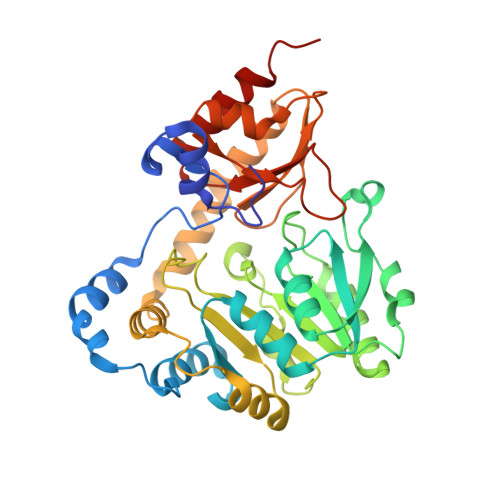Structural studies of the L-threonine-O-3-phosphate decarboxylase (CobD) enzyme from Salmonella enterica: the apo, substrate, and product-aldimine complexes.
Cheong, C.G., Escalante-Semerena, J.C., Rayment, I.(2002) Biochemistry 41: 9079-9089
- PubMed: 12119022
- DOI: https://doi.org/10.1021/bi020294w
- Primary Citation of Related Structures:
1L4N, 1L5F, 1L5K, 1L5L, 1L5M, 1L5N, 1LC5, 1LC7, 1LC8 - PubMed Abstract:
The evolution of biosynthetic pathways is difficult to reconstruct in hindsight; however, the structures of the enzymes that are involved may provide insight into their development. One enzyme in the cobalamin biosynthetic pathway that appears to have evolved from a protein with different function is L-threonine-O-3-phosphate decarboxylase (CobD) from Salmonella enterica, which is structurally similar to histidinol phosphate aminotransferase [Cheong, C. G., Bauer, C. B., Brushaber, K. R., Escalante-Semerena, J. C., and Rayment, I. (2002) Biochemistry 41, 4798-4808]. This enzyme is responsible for synthesizing (R)-1-amino-2-propanol phosphate which is the precursor for the linkage between the nucleotide loop and the corrin ring in cobalamin. To understand the relationship between this decarboxylase and the aspartate aminotransferase family to which it belongs, the structures of CobD in its apo state, the apo state complexed with the substrate, and its product external aldimine complex have been determined at 1.46, 1.8, and 1.8 A resolution, respectively. These structures show that the enzyme steers the breakdown of the external aldimine toward decarboxylation instead of amino transfer by positioning the carboxylate moiety of the substrate out of the plane of the pyridoxal ring and by placing the alpha-hydrogen out of reach of the catalytic base provided by the lysine that forms the internal aldimine. It would appear that CobD evolved from a primordial PLP-dependent aminotransferase, where the selection was based on similarities between the stereochemical properties of the substrates rather than preservation of the fate of the external aldimine. These structures provide a sequence signature for distinguishing between L-threonine-O-3-phosphate decarboxylase and histidinol phosphate aminotransferases, many of which appear to have been misannotated.
Organizational Affiliation:
Department of Biochemistry, University of Wisconsin, Madison, Wisconsin 53706, USA.
















